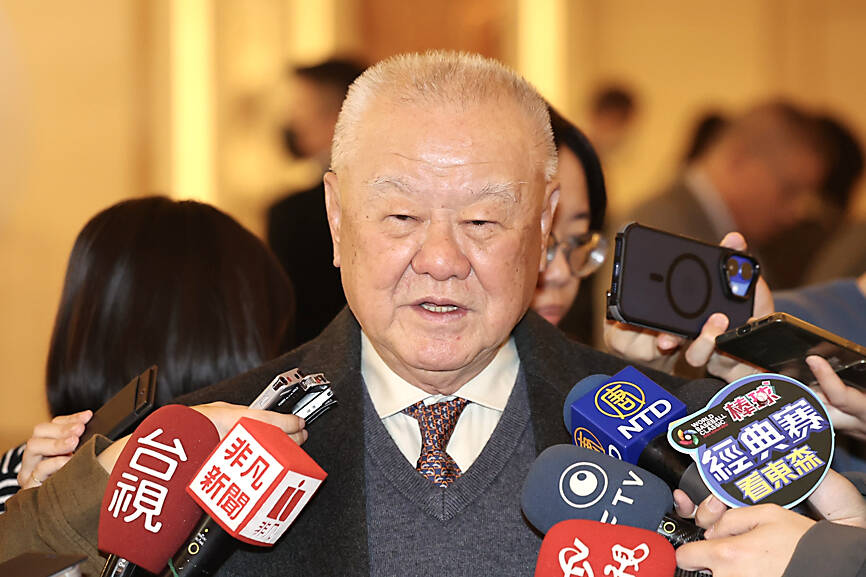Taiwan must secure tariff terms from the US that are on par with those granted to key export rivals such as Japan and South Korea or risk ceding competitiveness in global markets, a leading industrialist said yesterday, as concerns mount over trade barriers and currency volatility.
Lin Por-fong (林伯豐), chairman of Taiwan Glass Industry Corp (台灣玻璃) and head of the Third Wednesday Club (三三會) — an exclusive body for Taiwan’s top 100 business leaders — said that Taiwan cannot afford to be optimistic ahead of Washington’s release of “reciprocal” tariff rates.
“Taiwan lacks bargaining leverage with the US and we should not be optimistic until details are confirmed,” Lin said at the group’s monthly meeting.

Photo: CNA
The US has announced a 20 percent tariff on Vietnamese goods, 25 percent on Japanese and South Korean goods, 30 percent on the EU, 35 percent on Canadian products and 50 percent on Brazilian goods.
The announcements have triggered concern among trading partners, many of whom are now pursuing talks for more favorable terms. US President Donald Trump has extended the implementation deadline for tariffs to Aug. 1.
Taiwanese exports to the US could suffer as a result of heightened tariffs, Lin said, adding that the government should assess its strategy carefully.
To reduce overreliance on the US market, Taiwan should accelerate efforts to expand trade with China, Southeast Asia and Europe, Lin said.
He also urged the government to pursue free-trade agreements more aggressively to provide better export access for Taiwanese firms.
Taiwan’s currency appreciation poses an even more immediate threat to exporters than tariffs, he added.
The New Taiwan dollar has gained more than 5 percent against the US dollar since 2023, eroding export margins and weakening price competitiveness, he said, citing central bank data.
“While a strong NT dollar helps tame import prices and domestic inflation, it places a heavy burden on exporters,” Lin said.
He called on the central bank to preserve a market-driven exchange rate regime, while being ready to intervene to curb speculative inflows and excessive appreciation.
Exporters in the textile, bicycle, machine tool and food processing industries are particularly vulnerable to the local currency’s upswings, Lin said.
He proposed the establishment of a foreign-exchange support fund to provide temporary financing, business transformation consulting and worker retraining assistance.
To boost longer-term resilience, the government should scale up digital transformation subsidies and smart manufacturing programs for small and medium-sized enterprises (SME), helping traditional sectors integrate artificial intelligence and automation into logistics and production, he said.
“These efforts can help non-tech industries shift away from price-driven strategies and focus on value-added output,” Lin said.
He also suggested launching a campaign to teach about foreign-exchange risk management, in cooperation with banks and regulators, to help SMEs better use hedging instruments and currency tools.

In Italy’s storied gold-making hubs, jewelers are reworking their designs to trim gold content as they race to blunt the effect of record prices and appeal to shoppers watching their budgets. Gold prices hit a record high on Thursday, surging near US$5,600 an ounce, more than double a year ago as geopolitical concerns and jitters over trade pushed investors toward the safe-haven asset. The rally is putting undue pressure on small artisans as they face mounting demands from customers, including international brands, to produce cheaper items, from signature pieces to wedding rings, according to interviews with four independent jewelers in Italy’s main

Japanese Prime Minister Sanae Takaichi has talked up the benefits of a weaker yen in a campaign speech, adopting a tone at odds with her finance ministry, which has refused to rule out any options to counter excessive foreign exchange volatility. Takaichi later softened her stance, saying she did not have a preference for the yen’s direction. “People say the weak yen is bad right now, but for export industries, it’s a major opportunity,” Takaichi said on Saturday at a rally for Liberal Democratic Party candidate Daishiro Yamagiwa in Kanagawa Prefecture ahead of a snap election on Sunday. “Whether it’s selling food or

CONCERNS: Tech companies investing in AI businesses that purchase their products have raised questions among investors that they are artificially propping up demand Nvidia Corp chief executive officer Jensen Huang (黃仁勳) on Saturday said that the company would be participating in OpenAI’s latest funding round, describing it as potentially “the largest investment we’ve ever made.” “We will invest a great deal of money,” Huang told reporters while visiting Taipei. “I believe in OpenAI. The work that they do is incredible. They’re one of the most consequential companies of our time.” Huang did not say exactly how much Nvidia might contribute, but described the investment as “huge.” “Let Sam announce how much he’s going to raise — it’s for him to decide,” Huang said, referring to OpenAI

The global server market is expected to grow 12.8 percent annually this year, with artificial intelligence (AI) servers projected to account for 16.5 percent, driven by continued investment in AI infrastructure by major cloud service providers (CSPs), market researcher TrendForce Corp (集邦科技) said yesterday. Global AI server shipments this year are expected to increase 28 percent year-on-year to more than 2.7 million units, driven by sustained demand from CSPs and government sovereign cloud projects, TrendForce analyst Frank Kung (龔明德) told the Taipei Times. Demand for GPU-based AI servers, including Nvidia Corp’s GB and Vera Rubin rack systems, is expected to remain high,